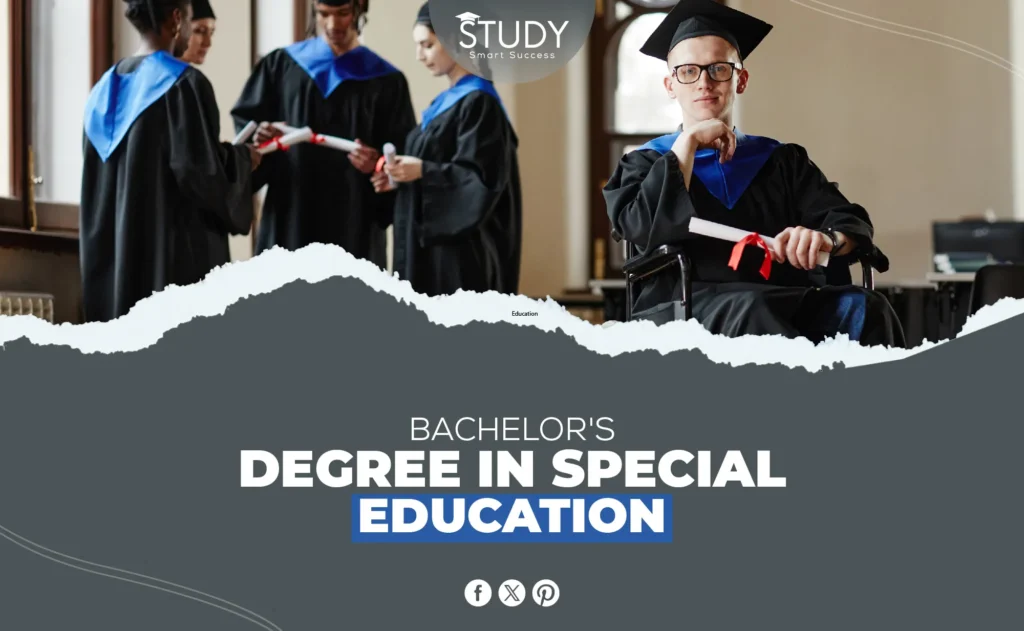As we explore special education, we must understand its crucial role in promoting educational equity. This introduction brochure explains the Bachelor’s Degree in Special Education, its career prospects, and the skills needed to succeed in this rewarding industry. Click here to read Master’s Degree in Special Education.
Significance of Bachelor’s Degree in Special Education
Bachelor’s degrees in special education are essential in education and beyond. This specialized degree gives practitioners the knowledge, skills, and compassion to empower and support diverse learners. It is a foundation for professionals promoting inclusivity, equity, and disability rights.
A Bachelor’s Degree in Special Education prepares graduates to navigate the educational landscape, embrace diversity, and create environments where every student can thrive academically, socially, and emotionally through rigorous coursework, practical experiences, and immersive fieldwork.
A Bachelor’s Degree in Special Education
What is a Bachelor’s Degree in Special Education?
Graduates with a Bachelor’s in Special Education can work with students with special needs. The numerous disabilities, teaching tactics, assessment methods, and special education rules and regulations are covered in detail. Students learn how to serve students with disabilities in school and foster their academic, social, and emotional growth through coursework, fieldwork, and practical training.
Curriculum Overview
- Core Courses: Special education theory and practice, educational psychology, child development, assessment and evaluation, and classroom management are typical essential topics. These courses give a theoretical foundation and practical skills for dealing with disabled students.
- Specialized Tracks or Concentrations: Some Bachelor’s Degrees in Special Education programs allow students to specialize in autism spectrum disorders, intellectual disabilities, or emotional and behavioral issues. These specialist tracks offer in-depth special education coursework.
- Fieldwork and Internship Requirements: Bachelor’s degrees in special education require fieldwork and internships. These allow students to apply classroom learning in real-world settings, interact with students with disabilities, collaborate with educators and families, and acquire practical skills under the leadership of experienced professionals.
Accreditation and Program Quality
Accrediting authorities guarantee that Bachelor’s Degrees in Special Education satisfy quality and rigor standards. Faculty qualifications, curriculum content, student learning outcomes, and program effectiveness are strictly regulated in accredited programs. Students should choose programs approved by respected accrediting agencies like CAEP or NCATE to ensure quality and legitimacy. Graduation, license exam pass rates, alum satisfaction, and employer input indicate program excellence.
Career Opportunities with a Bachelor’s Degree in Special Education
A. Teaching Roles
- Special Education Teacher: Bachelor of Special Education graduates can teach special education in public or private schools. These professionals create and administer individualized education plans (IEPs), adjust curriculum, and provide specialized teaching for children with disabilities. Click here to read What does a special education teacher do.
- Resource Room Teacher: Resource room teachers encourage and instruct disabled kids in small groups to improve academic skills and meet IEP goals. They may work with general education teachers and specialists to meet students’ needs.
- Inclusion Teacher: Co-teachers, or inclusion teachers, assist general education teachers in inclusive classes with disabled children. They work with colleagues to differentiate instruction, modify curriculum, and create a supportive learning environment for all kids.
B. Related Career Paths
- Behavior Analyst: Behavior analysts work with people with disabilities to assess behavior patterns, establish behavior intervention programs, and use evidence-based methods to address challenging behaviors. Behavior analyzers collaborate with interdisciplinary teams to assist behavioral and social-emotional needs in schools, clinics, and communities.
- Educational Consultant: Educational consultants advise schools, districts, and organizations on special education policies, procedures, and initiatives. They may lead professional development seminars, evaluate programs, and report on inclusive education, assessment, and intervention initiatives.
- Curriculum Developer: Special education curriculum developers adjust curriculum, instructional resources, and assessment methods to accommodate the different learning requirements of students with disabilities. They work with educators, subject specialists, and instructional designers to make learning accessible, engaging, and effective for students of all abilities and styles.
C. Job Outlook and Salary Expectations
The job prospects for Bachelor of Special Education graduates depend on geography, experience, and career route. The U.S. Bureau of Labor Statistics (BLS) predicts 8% growth in special education teacher employment from 2020 to 2030 due to rising demand for services and awareness of inclusive education.
The median annual salary for special education teachers is $50,000 to $65,000, while behavior analysts and educational consultants earn more.
Skills and Qualities Needed
Patience and Empathy:
Special education providers need patience and sensitivity. Working with diverse learners involves empathy, compassion, and support. Patience lets teachers tailor support to different learning styles, while empathy helps them grasp students’ unique viewpoints and experiences.
Adaptability and Flexibility:
Special educators must be flexible when educating and helping disabled students. They must adapt teaching methods, learning styles, and classroom surroundings to match students’ requirements. Adaptability allows educators to handle unforeseen events and customize responses to students’ changing strengths and weaknesses.
Communication and Collaboration:
Special education requires strong communication and teamwork abilities. Educators must communicate clearly and effectively to create understanding, trust, and positive connections with students, families, coworkers, and other stakeholders.
Collaboration entails working with interdisciplinary teams of general education teachers, specialists, therapists, and support personnel to coordinate services, share information, and create comprehensive support plans for disabled kids.
Knowledge of Special Education Laws and Policies:
Special education professionals must know the laws and policies to comply, advocate for kids, and offer appropriate services and support. The Individuals with Disabilities Education Act (IDEA), Section 504 of the Rehabilitation Act, and the ADA, as well as state and municipal special education rules, must be known by educators. This information helps instructors understand legal obligations, advocate for fair education, and ensure students obtain their rights to services and accommodations.
How to Pursue a Bachelor’s Degree in Special Education
Researching Programs:
It would help if you investigated Bachelor’s Degree in Special Education programs to find the most excellent fit for your academic and career goals. Discuss program accreditation, faculty expertise, curriculum, fieldwork, and practical experiences. By researching different schools, determine which special education programs match your interests and goals.
Admission Requirements:
Bachelor’s Degree in Special Education admittance requirements vary by university or college. A high school diploma or equivalent, SAT or ACT scores, letters of recommendation, a personal statement or essay, and an admissions interview may be required. Review and prepare for the admission requirements of the programs you’re interested in.
Financial Aid and Scholarships:
Scholarships, grants, loans, and work-study programs may help you pay for your Bachelor of Special Education: research special education scholarships and general scholarships from universities, private groups, and government agencies. Fill out the FAFSA to discover your federal financial aid eligibility.
Tips for Success in the Program:
Once enrolled in a Bachelor’s Degree in Special Education program, there are several tips for success to keep in mind:
- Stay organized and manage your time effectively to balance coursework, field experiences, and other commitments.
- Actively engage in your classes, participate in discussions, and seek clarification when needed.
- Build relationships with faculty, advisors, and peers for support and guidance throughout your academic journey.
- Take advantage of opportunities for hands-on experience, such as practicum placements or internships, to apply theoretical knowledge in real-world settings.
- Attend conferences, workshops, and professional development opportunities to stay current with research and best practices in special education.
- Seek out mentorship and networking opportunities within the field of special education to gain insights and perspectives from seasoned professionals.
- Prioritize self-care and well-being to maintain balance and resilience amidst the demands of coursework and fieldwork experiences.
Conclusion
To earn a bachelor’s in special education, you must research schools, entrance requirements, financial aid, and success techniques. Special education programs help students develop the information, skills, and experiences needed to help disabled people. Special education achievement requires collaboration, advocacy, and perseverance.
A Bachelor’s Degree in Special Education is an exciting way to contribute to education and improve the lives of disabled students. This degree can give students the skills, compassion, and dedication to help diverse learners and promote inclusive practices in schools and communities.
When considering a Bachelor’s Degree in Special Education, realize that your journey is just beginning. Be curious, keep learning, and enjoy the challenges and pleasures of special education. Professional organizations, research publications, and online communities can help you learn more about the topic and meet other disability-focused educators and professionals.
In conclusion, a Bachelor’s Degree in Special Education is a noble and satisfying path that gives personal fulfillment, professional advancement, and meaningful impact. With enthusiasm and determination, you may change the lives of students with disabilities and help create more inclusive and equitable educational opportunities for all.



